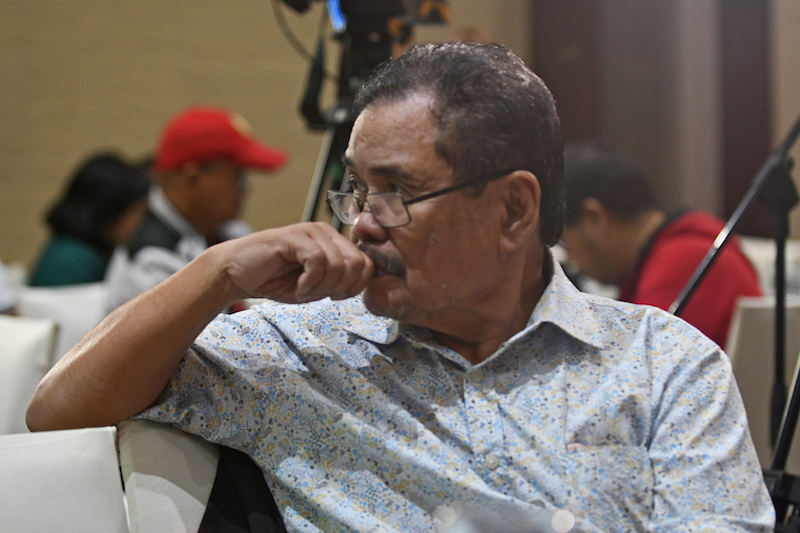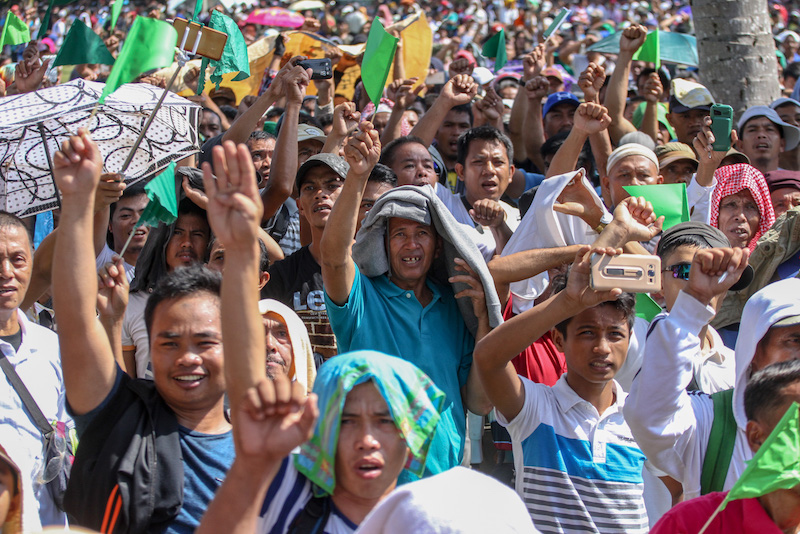 Mohagher Iqbal, chair of the peace implementing panel of the Moro Islamic Liberation Front, is in deep thought during the consultation on RA 11054 or the Organic Law for the Bangsamoro Autonomous Region in Muslim Mindanao at the Luxe Hotel in Cagayan de Oro on Wednesday, Sept 5, 2018. MindaNews photo by FROILAN GALLARDO
Mohagher Iqbal, chair of the peace implementing panel of the Moro Islamic Liberation Front, is in deep thought during the consultation on RA 11054 or the Organic Law for the Bangsamoro Autonomous Region in Muslim Mindanao at the Luxe Hotel in Cagayan de Oro on Wednesday, Sept 5, 2018. MindaNews photo by FROILAN GALLARDO
DAVAO CITY (MindaNews/ 31 Oct) – Barely three months before its scheduled ratification, a petition has been filed before the Supreme Court questioning the constitutionality of the Organic Law on the Bangsamoro Autonomous Region in Mindanao.
Through Governor Abdusakur Tan II, the Province of Sulu submitted a 48-page petition this month asking the high tribunal to declare Republic Act No. 11054 unconstitutional and stop the conduct of a plebiscite set on January 21 next year.
Named respondents in the petition are Presidential Peace Adviser Jesus Dureza, the Senate, the House of Representatives, the Commission on Elections, the Bangsamoro Transition Commission, and the Moro Islamic Liberation Front.
It asked for certiorari and prohibition with a request for temporary restraining order to prevent the Comelec from holding the plebiscite.
‘Only one organic act’
The petition argued that the law cannot abolish the Autonomous Region in Muslim Mindanao (ARMM) and replace it with a Bangsamoro Autonomous Region (BAR) because the Constitution allows only one organic act to establish an autonomous region in Muslim Mindanao.
“Since ARMM is created by Constitutional fiat, Congress, by itself, has absolutely no authority to abolish ARMM. Only through an amendment of the Constitution may ARMM be abolished. This is so, because only the Constitution may create or abolish an autonomous region,” it said.
Questions on plebiscite
The petition questioned the law’s provision on the plebiscite that the votes of the provinces and cities under the ARMM will be treated as “one geographical area.”
“[T]o consider the provinces and cities of the ARMM as one geographical area for purposes of voting in the plebiscite to ratify the BOL violates the constitutional requirement enshrined in Section 18, 2nd paragraph, Article X of the Constitution that the creation of the autonomous region shall be effective when approved by majority of the votes cast by the constituent units in a plebiscite called for the purpose,” it said.
ARMM comprises the provinces of Basilan, Lanao del Sur, Maguindanao, Sulu and Tawi-Tawi and the cities of Marawi and Lamitan.
‘Why MILF?’
The petition also questioned the designation of the Moro Islamic Liberation Front as head of the Bangsamoro Transition Authority (BTA) to the prejudice of other rebel groups in Mindanao, as well as Muslims and non-Muslims who are not MILF members.
 MILF supporters shout the Takbir during the Consultative Assembly on the Bangsamoro Organic Law inside Camp Darapanan in Simuay, Sultan Kudarat, Maguindanao on 29 July 2018. MindaNews photo by MANMAN DEJETO
MILF supporters shout the Takbir during the Consultative Assembly on the Bangsamoro Organic Law inside Camp Darapanan in Simuay, Sultan Kudarat, Maguindanao on 29 July 2018. MindaNews photo by MANMAN DEJETO
“Without a doubt, Section 2, Article XVI of BOL was included in the law solely for the purpose of placing the MILF in a class of its own, to the exclusion of others similarly situated, in violation of the equal protection clause mandated by our Constitution,” it said.
After the ratification of the Bangsamoro law, the ARMM is deemed abolished and the BTA will assume as caretaker government until the holding of regular elections for the region in 2022.
‘Due diligence’ in crafting the law
Dureza, in a statement issued on Monday, expressed confidence the Bangsamoro law can withstand the constitutionality test.
“The Bangsamoro Transition Commission that drafted the Bangsamoro Organic Law complied with President Duterte’s directive that it will comply with all previously signed agreements in step with constitutional and legal reforms,” he said
“Both chambers of Congress, the Senate and the House and their legal minds painstakingly worked on the law. They scrutinized its fine points and fine- tuned them taking into account the landmark decisions of the Supreme Court and drew from the lessons of the past. There was also due diligence done by the legal minds of the executive department before the President affixed his signature to RA 11054,” he added.
He said he was leaving the fate of the law in the hands of the SC.
‘More than just a law’
Mohagher Iqbal, chief peace negotiator of the MILF, said they’re hoping that “altruistic reasons drove him (Tan) rather than prolonging a political career.”
“The BOL is more than a piece of legislation. It is a product of the 17 years of difficult peace negotiations and four years of arduous drafting and consultation process with a variety of stakeholders in the Bangsamoro as well as eminent constitutionalists and legal experts. The BOL hopes to fulfill the Bangsamoro’s right to self-determination, address the historical grievances of the Bangsamoro people and introduce necessary reforms to promote good governance and improve the delivery of services in a region gravely affected by decades-long conflict.
“The BOL, compared to RA 9054 and RA 6734, has provisions that will grant the Bangsamoro people, including the Sulu province, the opportunity to chart their political, economic and social future. Surely, the Sulu governor can see value in that?” Iqbal said.
“We can only hope that the honorable men and women of the high court would see that the BOL will help reinforce and strengthen the political and legal foundation of just and lasting peace in the region. Moreover, it was deliberated upon and approved by the Congress’ best legal minds who are also confident that the BOL can stand the test of constitutionality in the Supreme Court. In the meantime, the Moro Islamic Liberation Front will remain committed to the peace process and work with various stakeholders in Mindanao,” he added. (MindaNews)
